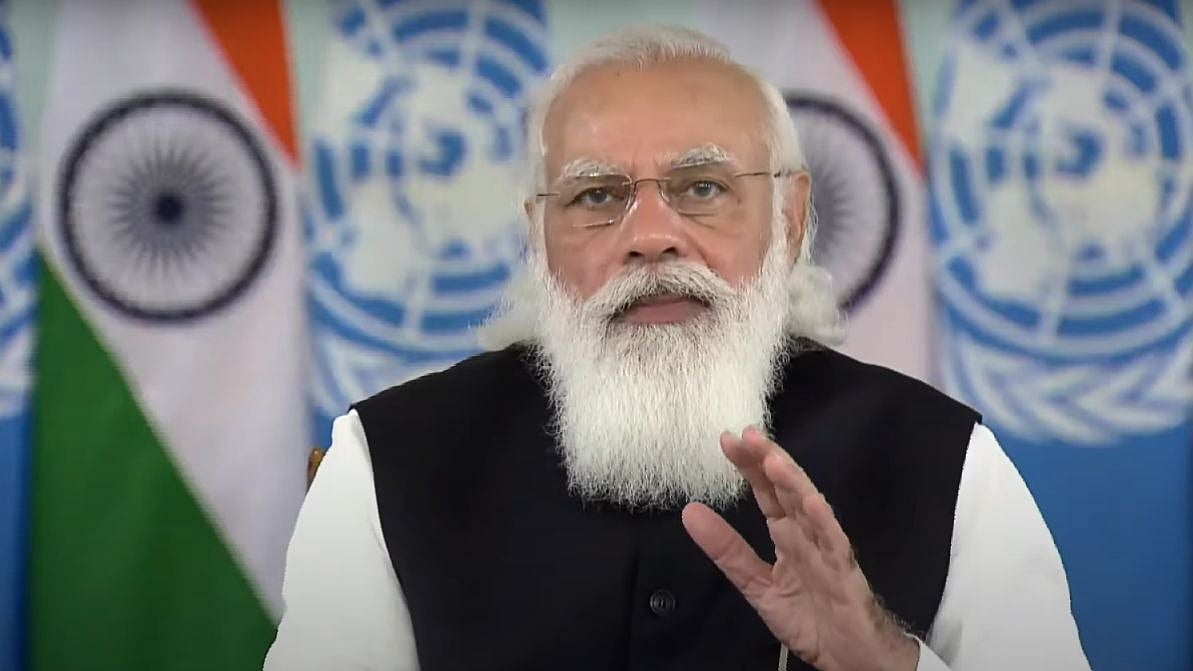Any Hindrance to Maritime Trade Can Hurt Economy: PM Modi at UNSC Debate
Following PM Modi's address, UNSC adopted the first-ever presidential statement on maritime security.

advertisement
Chairing the United Nations Security Council (UNSC) Open Debate on ‘Enhancing Maritime Security: A Case for International Cooperation’, Prime Minister Narendra Modi on Monday, 9 August, said that any hindrance to maritime trade can hurt the global economy.
Flagging the misuse of maritime routes for piracy and terrorism, Modi put forth five principles during his address, including the removal of barriers from legitimate maritime trade and the settlement of disputes peacefully and according to international law.
‘Must Face Maritime Threats Together’
Among the other principles he cited included responsible maritime connectivity, the need to collectively combat maritime threats posed by non-state actors and natural calamities, and safeguarding maritime environment and resources from pollution.
Emphasising on the need to keep in mind fiscal sustainability and capacity of countries while building infrastructure projects to enhance maritime trade, the PM said:
"A productive UNSC open debate on Maritime Security. UNSC chaired by an Indian PM for the first time. Two Presidents, one PM, and ten Minister joined PM @narendramodi on this important occasion (sic)," External Affairs Minister Dr S Jaishankar tweeted after the meeting.
"Ten non-Council members sent their written position underlining that the debate was timely and relevant. PM articulated five key martime principles — on trade, disputes, natural disasters, environment, and connectivity," he said in another tweet.
PM Modi’s address came days after India took over the rotating presidency of UNSC from France on 1 August. TS Tirumurti, the Permanent Representative of India to the UN, said that they three key focus areas will be maritime security, peacekeeping and counter-terrorism.
India has held the presidency seven times in the past.
UNSC Unanimously Adopts Presidential Statement on Maritime Security
Following PM Modi's address, UNSC adopted the first-ever presidential statement on maritime security.
The statement expresses concern over the ongoing threats to maritime safety and security posed by piracy, armed robbery at sea, terrorists’ travel and use of sea to conduct crimes and acts against shipping, offshore installations, critical infrastructure, and other maritime interests.
The UNSC signatories acknowledged that terrorists may benefit from transnational organised crime in specific contexts and regions.
The presidential statement called upon member states to consider the ratification and implementation of global instruments as well as their participation in national, regional, and global initiatives that aim to build capacity to prevent and counter the illicit trafficking, including through seaports and at sea, of natural resources, arms, drugs, cultural property, and illicit trade in direct support of terrorism networks, as well as trafficking in persons.
"Statement on Maritime Security unanimously adopted by UNSC. Thank all Council members for supporting the first signature event of Indian Presidency, (sic)" External Affairs Minister Jaishankar said in a tweet.
(With inputs from ANI and PTI.)
(At The Quint, we question everything. Play an active role in shaping our journalism by becoming a member today.)